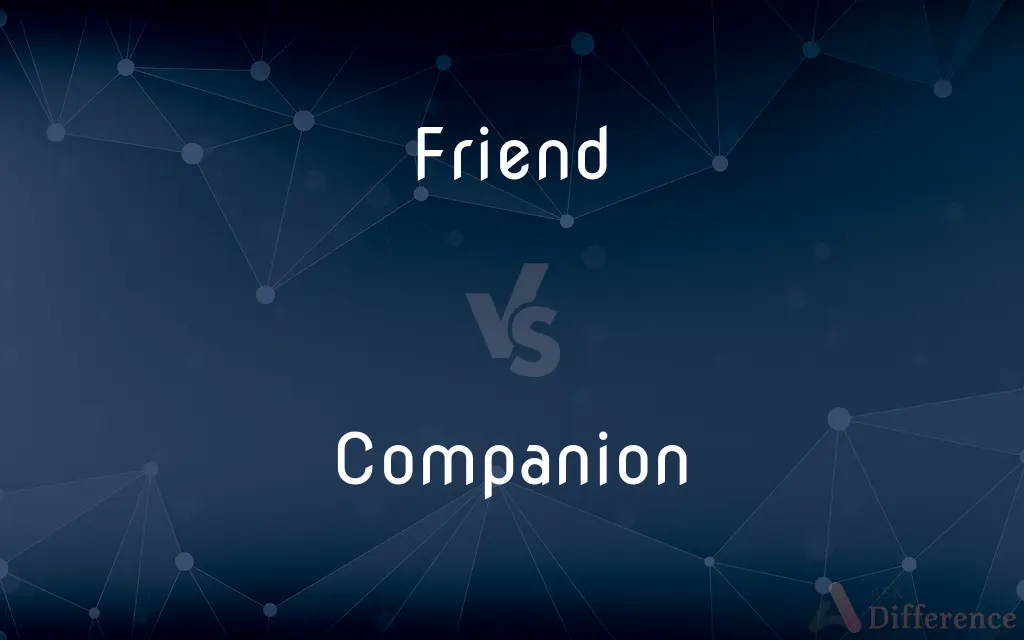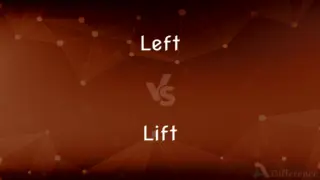Friend vs. Companion — What's the Difference?
By Urooj Arif & Fiza Rafique — Updated on February 26, 2024
A friend is someone with whom one shares a deep, personal bond and mutual affection, involving shared experiences and emotional support. A companion, also implying companionship, refers to someone who accompanies another without the depth of emotions.

Difference Between Friend and Companion
Table of Contents
ADVERTISEMENT
Key Differences
The term "friend" implies a relationship built on trust, mutual interests, and emotional connections that have developed over time. Friends share personal experiences, support each other emotionally, and often have a strong bond that can endure challenges. In contrast, a "companion" denotes someone who is present with another for company or assistance, which might not necessarily involve an emotional bond or long-term commitment. This can include someone who accompanies another on travels, activities, or in daily tasks.
Friendships are characterized by voluntary mutual support, understanding, and the sharing of joys and sorrows. This relationship is often seen as an essential aspect of one's social and emotional life. On the other hand, companionship can be more situational, with the primary role being to provide company or fulfill a specific need, such as companionship for a social event, without the deeper layers of emotional intimacy and shared history that characterize friendship.
A friend can certainly be a companion, engaging in various activities together, the reverse is not always true; not all companions are friends. The distinction lies in the emotional depth and the nature of the connection. Companions may spend time together based on circumstances or convenience, without the relationship evolving into the deeper, more emotionally supportive territory of friendship.
The expectation and responsibilities within these relationships also differ. Friendship involves a mutual commitment to each other's well-being, often going above and beyond to help or support the other. In contrast, companionship may have more defined or limited expectations, focusing on shared activities or company rather than emotional support or personal sacrifice.
Comparison Chart
Basis of Relationship
Emotional connection, mutual interests
Company, assistance in activities
ADVERTISEMENT
Depth of Connection
Deep, involving personal and emotional support
Can be surface-level, situational
Duration
Long-term, enduring through life's ups and downs
Can be temporary or tied to specific contexts
Expectations
Mutual support, understanding, and sacrifice
Presence and company, with fewer emotional obligations
Activities
Shared experiences, often personal and meaningful
Activities shared may not require emotional investment
Compare with Definitions
Friend
Someone you enjoy spending time with because of shared interests and fun.
We became friends through our love of hiking.
Companion
A person who shares activities with another, especially for leisure.
She found a tennis companion at the club.
Friend
Someone you trust and share your feelings and secrets with.
He considered his childhood friend as his confidant.
Companion
Someone who accompanies another to provide assistance or as a courtesy.
Her companion helped her navigate the event.
Friend
A person who supports you in any situation.
My friend stood by me through difficult times.
Companion
Someone present with another, often in a professional or supportive role, without implying a deep personal relationship.
His companion for the conference was an expert in the field.
Friend
A person who is not just an acquaintance but an important part of your life.
Her friends played a key role in her happiness.
Companion
An individual hired to accompany or assist another, especially in daily tasks.
The elderly lady’s companion assists her with shopping.
Friend
An associate who provides assistance;
He's a good ally in fight
They were friends of the workers
Companion
To be a companion to; accompany.
Friend
A person with whom one is vaguely or indirectly acquainted.
A friend of a friend;
I added him as a friend on Facebook, but I hardly know
Companion
(dated) A person employed to accompany or travel with another.
Friend
One who entertains for another such sentiments of esteem, respect, and affection that he seeks his society and welfare; a wellwisher; an intimate associate; sometimes, an attendant.
Want gives to know the flatterer from the friend.
A friend that sticketh closer than a brother.
Companion
A person or animal with whom one spends a lot of time or travels.
His dog has been his faithful companion for years.
Friend
A person with whom one has a bond of mutual affection, typically exclusive of family relations.
She called her closest friend to share the news.
Companion
A person who accompanies or associates with another; a comrade.
Friend
A person whom one knows, likes, and trusts.
Companion
A person employed to assist, live with, or travel with another.
Friend
A person whom one knows; an acquaintance.
Companion
One of a pair or set of things; a mate.
Friend
A person, typically someone other than a family member, spouse or lover, whose company one enjoys and towards whom one feels affection.
John and I have been friends ever since we were roommates at college.
Trust is important between friends.
I used to find it hard to make friends when I was shy.
We became friends in the war and remain friends to this day.
We were friends with some girls from the other school and stayed friends with them.
Companion
A friend, acquaintance, or partner; someone with whom one spends time or accompanies
His dog has been his trusted companion for the last five years.
Friend
To act as a friend to, to befriend; to be friendly to, to help.
Companion
To be a companion to; to attend on; to accompany.
Friend
A person you know well and regard with affection and trust;
He was my best friend at the university
Companion
A traveler who accompanies you
Friend
A person with whom you are acquainted;
I have trouble remembering the names of all my acquaintances
We are friends of the family
Companion
Be a companion to somebody
Common Curiosities
Can a companion become a friend?
Yes, companions can become friends if they develop a deeper, emotional connection over time.
Do friends always do activities together?
While friends often share activities, their relationship is more defined by their emotional connection than the activities themselves.
What defines a friend?
A friend is defined by a deep, personal bond, mutual affection, and shared experiences.
What defines a companion?
A companion is defined by their role in providing company or assistance, without necessarily sharing a deep emotional bond.
Is emotional support more common in friendship or companionship?
Emotional support is more common and expected in friendships.
Is companionship important in a friendship?
Companionship is an aspect of friendship, but friendship encompasses deeper emotional bonds.
Can a family member be a friend?
Yes, family members can also be considered friends if they share mutual affection and support beyond familial obligations.
How does one transition from being a companion to a friend?
The transition involves developing mutual trust, sharing personal experiences, and providing emotional support.
Can one have companions without considering them friends?
Yes, it’s possible to have companions, such as colleagues or activity partners, who are not considered friends.
Is it easier to find a friend or a companion?
It is generally easier to find a companion, as friendship requires a deeper connection and more time to develop.
Share Your Discovery

Previous Comparison
Left vs. Lift
Next Comparison
Pendant vs. LocketAuthor Spotlight
Written by
Urooj ArifUrooj is a skilled content writer at Ask Difference, known for her exceptional ability to simplify complex topics into engaging and informative content. With a passion for research and a flair for clear, concise writing, she consistently delivers articles that resonate with our diverse audience.
Co-written by
Fiza RafiqueFiza Rafique is a skilled content writer at AskDifference.com, where she meticulously refines and enhances written pieces. Drawing from her vast editorial expertise, Fiza ensures clarity, accuracy, and precision in every article. Passionate about language, she continually seeks to elevate the quality of content for readers worldwide.
















































